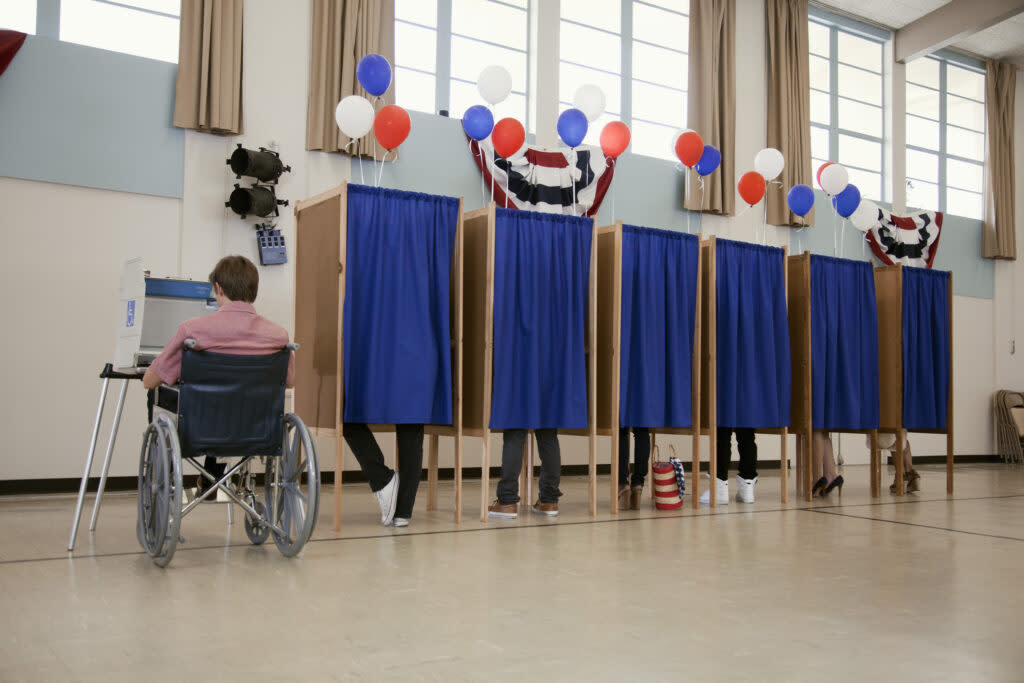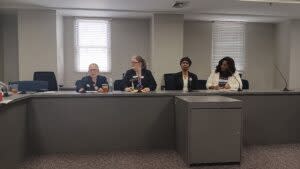New group will advocate for increased voting access for Alabamians with disabilities

A new group has formed that aims to make it easier for Alabamians with disabilities to vote. (Hill Street Studios via Getty Images)
A national group focused on expanding access to the ballot box for those with disabilities is launching a chapter in Alabama.
Register, Educate, Vote, Use your Power (REV UP) is a movement organized by the American Association of People with Disabilities. Advocates for those with disabilities launched the nonpartisan group in Texas in 2016, and now have chapters in 20 states.
“It is a movement of disability advocates for voting rights,” said Katie Toro, a peer advocate with the Disability Resource Network in Huntsville and one of the REV UP AL leaders during its inaugural news conference Thursday at the Statehouse. “However, that involves every type of barrier that is put in place with us. That includes transportation, that includes health care, that includes education, that includes just daily living.”
GET THE MORNING HEADLINES DELIVERED TO YOUR INBOX
According to the news release from REV UP, about 38 million people with disabilities are registered to vote. But turnout among those with disabilities lags the electorate as a whole.
Leaders of REV UP speak to reporters about the organization on Thursday, April 18, 2024 at the Alabama Statehouse in Montgomery, Alabama. (Ralph Chapoco/Alabama Reflector)
According to the Election Assistance Commission (EAC), a federal agency that provides information on election administration, turnout for those without a disability was about 52.4% for the 2022 midterm election but 50.9% for people with a disability.
In Alabama, about 51.1% of those without disabilities voted in the 2018 election, compared to 48.2% of those with disabilities. In 2022, 45.6% of Alabamians without disabilities cast ballots, versus 44.4% of those with disabilities.
The reasons for the gap could include access to casting absentee ballots, and in particular whether one can mail a ballot and whether a person must need to provide a reason to vote absentee. Alabama allows people who are ill or have a disability to cast absentee ballots, but they must declare that fact and have two witnesses sign an affidavit form.
Speakers at the news conference, all of whom have a disability of some kind, described the barriers they face in voting.
“There are times when I went to vote and the handicapped parking was blocked,” Toro said. “I couldn’t even get into a parking space to go in to vote. I remember the very first time I voted when I was 20 years old, they put me at a table in the center of the room, with zero privacy.”
Barbara Manuel, president of the National Federation of the Blind Alabama, said there were “many barriers” to voting, even with accessible machines.
“Most of the time, we go to several of these locations, the workers do not know how to operate the machines,” Manuel said. “They are usually not even turned on. They are covered up somewhere in a corner.”
The group plans to provide training on how to organize and network. One of the group’s initial goals is to urge lawmakers to support legislation to provide people with a disability with absentee voting opportunities.
“The REV UP Alabama coalition will provide a much-needed, powerful voice for advocacy on accessibility and voting rights concerns for Alabama’s disabled citizens,” Kathy Jones, the president of the League of Women Voters Alabama, said in a statement announcing the formation of the group.
The organization is forming after the Alabama Legislature passed SB 1, sponsored by Sen. Garlan Gudger, R-Cullman, which criminalizes some forms of voting assistance. The legislation passed with overwhelming support from Republicans while Democrats largely opposed passage.
HB 207, sponsored by Rep. Adline Clarke, D-Mobile, would allow a voter who is disabled to designate a person to deliver an application for an absentee ballot to an absentee election manager. The bill also allows a voter who is disabled to designate a person to deliver the absentee ballot itself to an election manager.
However, the legislation has not moved out of committee. It will take four legislative days to pass. Tuesday will be the 24th legislative day of the 2024 legislative session, which can run a maximum of 30 legislative days in a 105-day calendar period.
The post New group will advocate for increased voting access for Alabamians with disabilities appeared first on Alabama Reflector.


